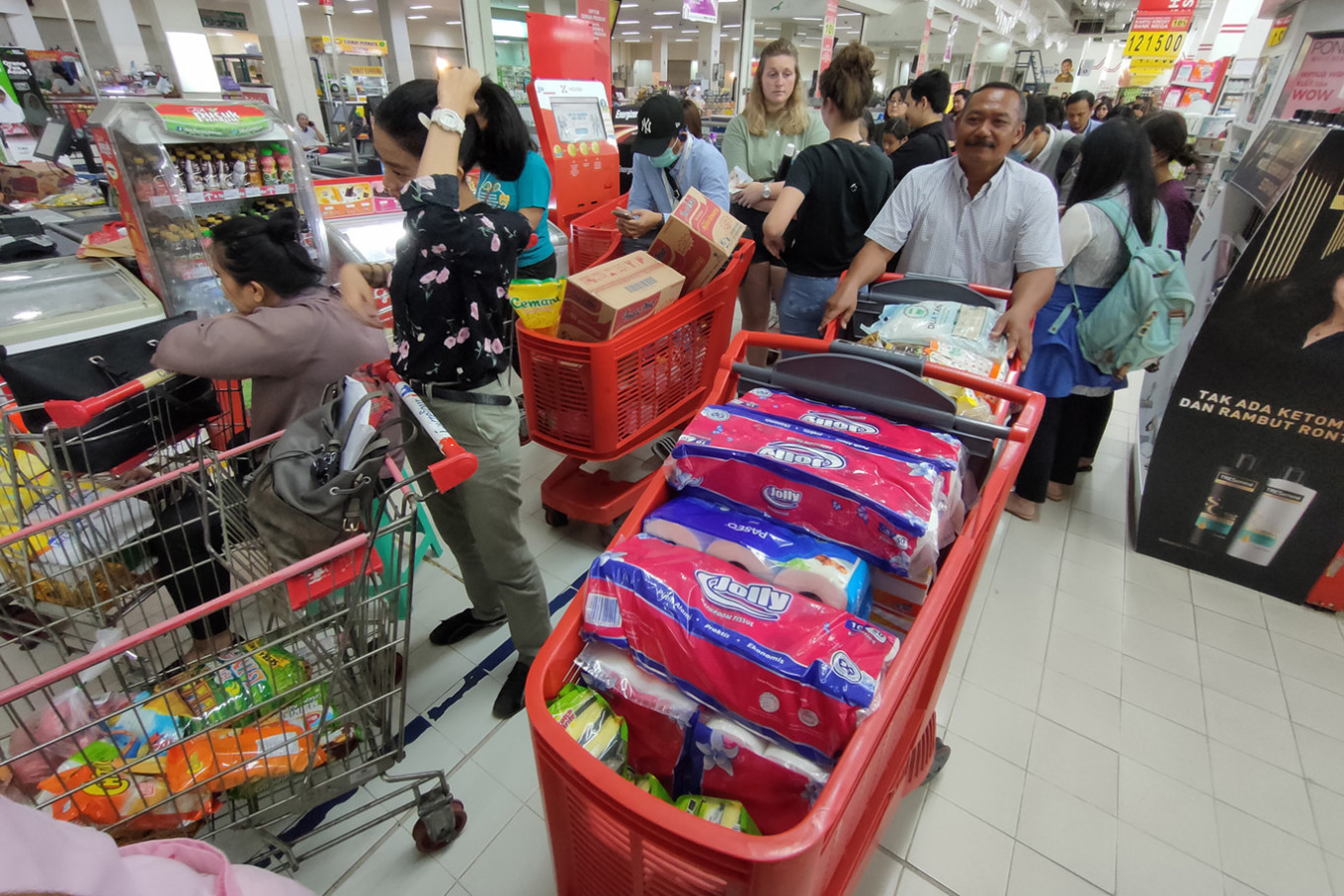Popular Reads
Top Results
Can't find what you're looking for?
View all search resultsPopular Reads
Top Results
Can't find what you're looking for?
View all search resultsStaple foods safe, but masks, sanitizer gone from markets as consumer behavior shifts
Markets across Indonesia are seeing an uptick in demand for hygiene products, although staple food availability remains safe as people purchase supplies to last a longer period to follow the universal health advise of staying home.
Change text size
Gift Premium Articles
to Anyone
A
manda, a 33-year-old creative consultant, has bought a month's worth of groceries in advance so she can stay home, as advised by the government, without having to worry about her family’s basic needs.
“I used to buy food supplies every one or two weeks. Now I buy one month's stock,” said the mother of one. “I bought three bags of 5 kilogram rice, whereas I normally only buy one bag, so I don’t go back and forth shopping. Plus, now that we are staying home, we are using up more food.”
Apart from rice, Amanda, who lives in South Jakarta, also stocks up on cooking oil, chicken, chili, vegetables, as well as hygiene products, more than ever. “Now I shop extra for hygiene products, such as anti-bacterial soap. Normally I would buy any soap. I stock up extra on hand soap as well so it is available at all washing stations at home. Tissue, detergents, cleaning liquid — I buy more than normal.”
Amanda’s story mirrors the shift in Indonesian consumers' behavior as markets across Indonesia see an uptick in demand for hygiene products, although staple food availability remains safe as people purchase supplies to last a longer period to follow the universal health advise of staying home.
Indonesia declared a public health emergency over COVID-19 on Tuesday, imposing large-scale social restrictions, as COVID-19 cases soared within a month from zero to 1,677, with 157 dead, the largest death toll in Southeast Asia and among the highest death rates in the world.
Publicly listed retailer PT Sumber Alfaria Trijaya — which operates 14,310 Alfamart stores across Indonesia — and PT Mitra Adiperkasa (MAP) — the operator of FoodHall — said the companies were having difficulty stocking up on certain items such as masks and hand sanitizer. However, both assured they had enough stock of primary items such as staple foods.
“We think this will last for quite some time before getting back to normal as people are rushing to buy these items,” Sumber Alfaria director S. Peter Suryadi said in a company statement. Alfamart stores are prepared for a lockdown scenario that could limit its business operations, he added.
Read also: Massive face mask, hand sanitizer shortage hit regions
“We met with [staple needs] producers and suppliers a few days ago, and they are committed to producing their products at full speed for the market,” MAP spokesperson Ratih Gianda told The Jakarta Post.
The Indonesian Consumers Foundation (YLKI) has called on vendors to limit purchases especially for products in shortage but highly needed, especially masks. Panic buying has hit supermarkets across Indonesia which could hurt stockpiles and inflate prices, with most purchases of masks, hygiene products and food.
“Since early February consumer complaints have been flooding in, especially on masks,” YLKI chairman Tulus Abadi said. The organization has reported the matter to the Trade Ministry and the National Police. The ministry has banned mask exports to ensure domestic supply and the police have been cracking down on hoarders and price-gouging shops to tackle the problem.
Indonesia Retailers Association (Aprindo) secretary-general Solihin told the Post that all of its members had enough supplies of staple food for the next few months leading up to the festive Ramadhan fasting month and Idul Fitri.
In anticipation of increased demand for staple foods during the festive period, Aprindo members decided to delay shipment of seasonal products such as crackers and syrups, which normally see a spike in demand during Ramadhan, and opted for staple foods instead.
“Shipments of festive products will be sent out gradually by our suppliers because we’re prioritizing our warehouses to store staple foods first,” said Solihin.
Read also: Indonesia not ready to impose lockdown, says Sri Mulyani
Agriculture Ministry data indicates that there is a large enough supply of basic commodities until Ramadhan, despite concerns over supply disruption caused by the COVID-19 pandemic. Rice supply is expected to be 8.35 million tons by May, while the figure stands at 263,851 tons for garlic, 584,709 tons for sugar and 68,904 tons for bird’s eye chili.
Agriculture observers, however, are skeptical about these figures. University of Lampung (Unila) agricultural economics professor Bustanul Arifin said people’s stockpiling behavior as a response to stricter social restriction combined with the real supply figure in the field would soon push up prices.
“Don’t play around with the staple food supply. Don’t let it be empty,” he warned.
Center for Indonesian Policy Studies (CIPS) researcher Felippa Ann Amanta also calls the data “very optimistic”, considering how COVID-19 has disrupted the agriculture sector. She added that the current large-scale restrictions could potentially disrupt logistics for distribution, threatening food availability.
“If we don’t control the coronavirus spread immediately, it is also possible to have labor shortages in the supply chain, which would then hamper food security,” she said.
PT Hero Supermarket head of communications and government relations Diky Risbianto said the supermarket was running low on several staple food products due to unnecessarily large purchases from its customers. Hero operates around 445 stores across Indonesia, consisting of Giant markets, Hero, Guardian and Ikea.
“Our team is working hard with our suppliers to fulfill our customers’ needs while also advising them to stay calm and not buy goods in huge amounts,” said Diky.
Esther Samboh contributed to this story










